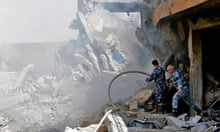The US has said it has proof that the Syrian regime carried out a chemical weapon attack on the outskirts of Damascus on Saturday, rejecting a Russian claim that it had been staged by British intelligence.
Both the White House and state department announced on Friday that the US had “a high level of confidence” about the regime’s culpability for the use of poisonous gas in Douma.
The declaration marked a shift from a statement by the defence secretary, James Mattis, on Thursday, that the US was still looking at the evidence. But the US envoy to the UN, Nikki Haley, told the security council that the Trump administration had still not decided on a military response.
The UK denounced as “a blatant lie” Russian claims that the country’s intelligence services were responsible for staging “the fake chemical weapons attack” in Douma, as a pretext for launching a wider military assault on the Syrian regime forces.
Moscow had previously said there was no traces of any chemical attack in Douma. Inspectors from the Organisation for the Prohibition of Chemical Weapons (OPCW) are due to visit the scene on Saturday. However, France, UK and the US have said their own evidence already points to Damascus.
Western diplomats would not rule out military action while the OPCW is on the ground, but said their capitals would try to avoid a situation in which inspectors could be vulnerable to harm or being taken hostage.
Asked about the Russian accusation against the UK, the White House spokeswoman, Sarah Sanders said: “Our intelligence tells us otherwise ... We have a very high confidence that Syria was responsible”.
The state department spokeswoman, Heather Nauert, said: “We can say that the Syrian government was behind this attack... We know there are only certain countries, like Syria, that have delivery mechanisms and have those types of weapons.”
Sergei Lavrov, the Russian foreign minister, said he had obtained documentary evidence showing that “special services of a country, which is now seeking to be in the first ranks of the Russophobic campaign, were involved in this staged event”. The UK Foreign Office said the claims were preposterous.
Alexander Yakovenko, the Russian ambassador to London, told reporters the UK-funded Syrian civil defence forces, the White Helmets, were responsible for staging fake chemical attacks by the Syrian army in an attempt to mislead the world. Igor Konashenkov, a Russian defence ministry spokesman, went further saying: “We have … evidence that proves Britain was directly involved in organising this provocation.”
He said Russia had proof that London put pressure on the White Helmets to stage the attack. The White Helmets is a humanitarian organisation made up of 3,400 volunteers who rescue civilians from the rubble after airstrikes.
Karen Pierce, Britain’s ambassador to the UN, described the claims as “grotesque, bizarre and a blatant lie”. She added: “I want to state categorically … that Britain has no involvement and would never have any involvement in the use of a chemical weapon.”
A Foreign Office spokesperson said: “Russia has wielded its UN security council veto six times since February 2017 to shield the Assad regime from scrutiny for its use of chemical weapons. These accusations from Moscow are just the latest in a number of ludicrous allegations from Russia, who have also said that no attack ever happened.
The allegations plunged the two countries’ intelligence agencies into yet more conflict, and came as the first members of a UN weapons inspectors fact-finding mission arrived in Damascus to see whether evidence remained to prove a chemical weapons attack had occurred, as photographs, blood samples and accounts from witnesses have shown. The inspectors are expected to be given access to Douma on Saturday.
António Guterres, the UN secretary general, insisted the inspectors from the OPCW must be given full and unfettered access to witnesses and buildings.
Russia, in conjunction with the forces of the Syrian president, Bashar-al Assad, is in charge of the Douma area.
At another highly charged session of the UN security council on Friday, Russia’s Vassily Nebenzia repeated the claim that the attack was staged. Hayley, his US counterpart, said she was “in awe” that Nebenzia could make such claims “with a straight face”.
Pressed outside the UN chamber on when the US would decide whether to launch a military strike, Haley said: “You don’t rush decisions like this.” She added that if there was haste, “you make a mistake”.
On Thursday Trump called Theresa May, the UK prime minister, and the two agreed “it was vital that the use of chemical weapons did not go unchallenged”. But the US delay in taking action appears to be caused by divisions between the White House and Jim Mattis, the US defence secretary, on the viable targets that could be struck in an effort to wipe out Syria’s alleged chemical weapons stores and factories.
The hesitation in Washington gave Recep Tayyip Erdoğan, the Turkish president, a chance to consult with Vladimir Putin to see whether they can construct a compromise that will avoid a military attack but still satisfy western demands that Russia stops protecting Assad’s breaches of the chemical weapons conventions. Macron, who on Thursday said he had proof of use of chemical weapons by Syrian regime – also called for dialogue with Russia.
But the glimmer of hope for diplomacy came alongside continued planning for a military assault. Britain’s military chiefs have been working on a range of scenarios over the last few days. The focuss of an attack would be on Syria’s alleged chemical weapons research and storage facilities.
Other targets under consideration by the Ministry of Defence, working in coordination with the US and France, include Syrian command and control centres as well as airbases, planes and helicopters.
An attack on Assad’s presidential palace in the hills above Damascus has been ruled out as a step too far. May will be challenged by MPs to spell out her military plans on Monday, if no weekend assault has been launched.
The planners are anxious to avoid destroying Russian equipment or killing Russian personnel based in Syria, potentially provoking a reaction from Moscow. They insist missiles and intelligence are better than in the 1991 Iraq war in which the Amiriyah bomb shelter was hit killing more than 400 civilians, or the Nato bombing of the Chinese embassy in Belgrade in 1999.
A spokesperson for the French defence ministry, chiming with MoD partners, said Macron had specified there would be no targeting of Russians in Syria and the focus would be on Syria’s alleged chemical weapons capabilities.
A prime target is the Scientific Studies and Research Centre, west of Damascus, which the US has claimed has been involved in the preparation of chemical weapons.
Targets could include airbases where the chemical weapons are alleged to have been stored, as well as aircraft which have allegedly been used attacks.
Hamish de Bretton-Gordon, an expert who led the UK and Nato chemical weapons response teams, said it was highly unlikely that an attack on Syrian chemical facilities risked spreading the poison.
“The best way to destroy chemical weapons is to blow them up,” he said.




